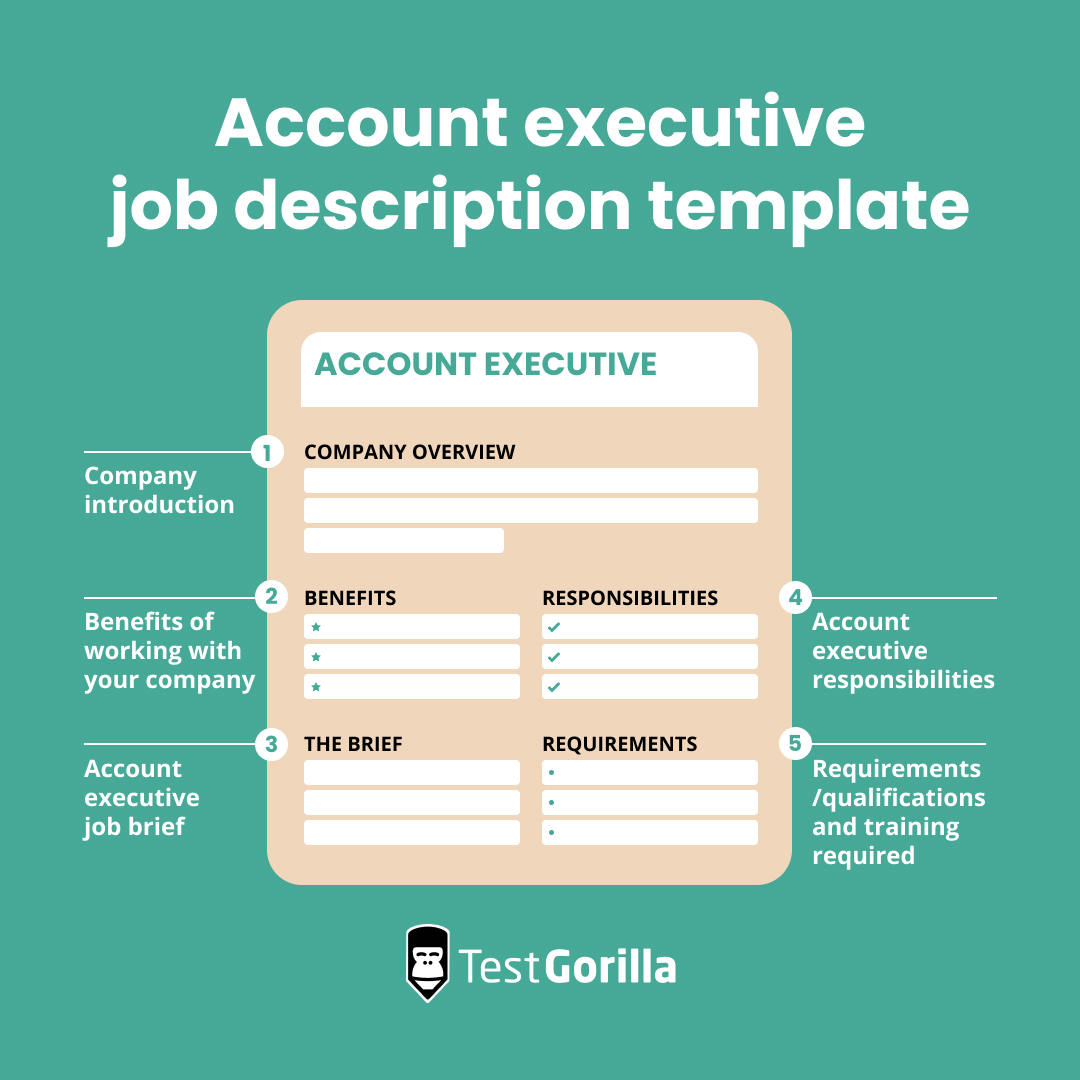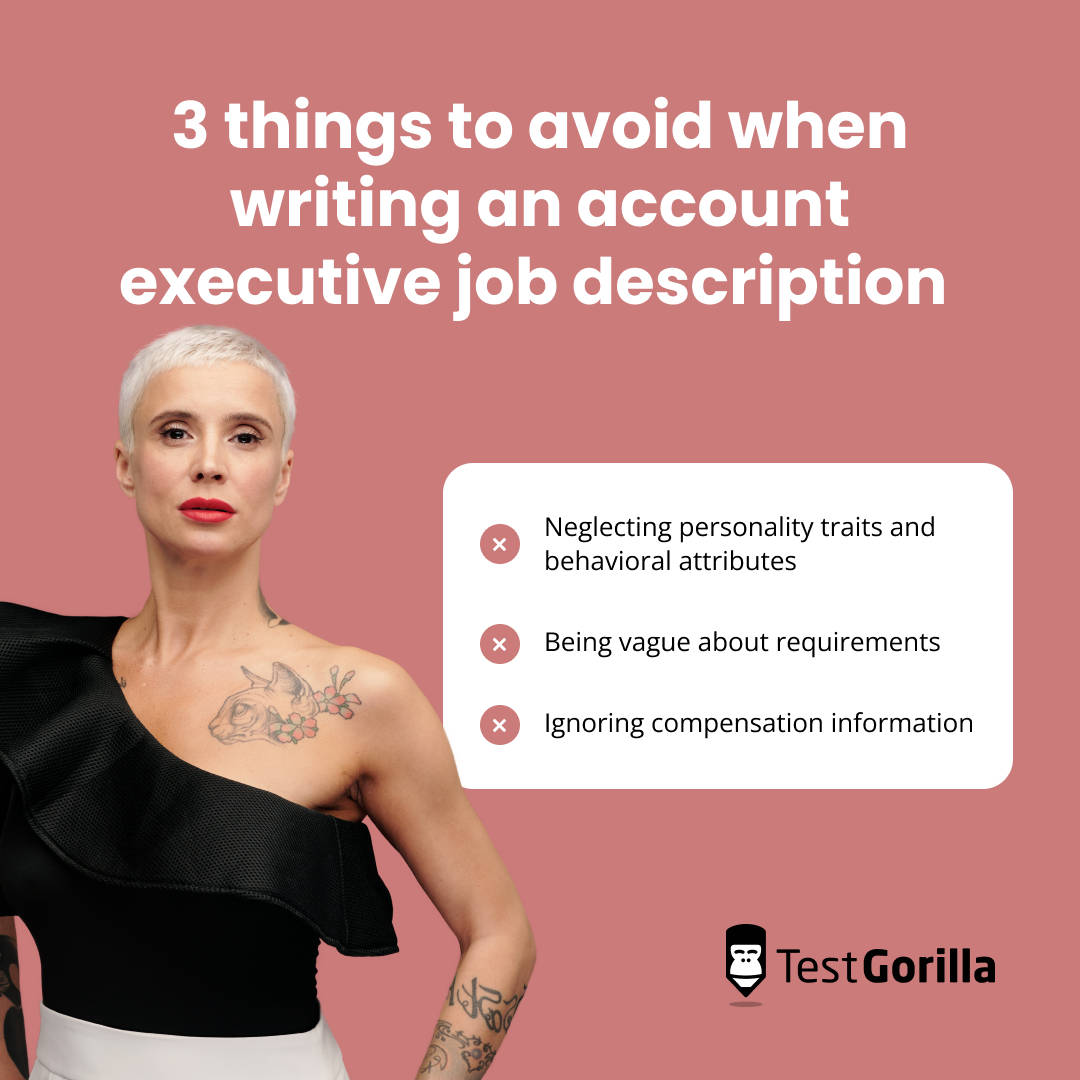Account executives play a pivotal role in generating sales and managing customer relationships. Therefore, hiring an ill-fitted candidate for this role can directly impact your revenue and damage your reputation with key customers.
Unfortunately, this isn’t uncommon. Sourcing the right talent for an account executive role is particularly challenging because candidates often confuse this role with other jobs – like customer success manager, account manager, or sales representative.
Thus, you need to write an airtight job description, clearly outlining role responsibilities and requirements and leaving no room for confusion.
Our top tips on writing an effective account executive job description can help. Below, we share these and more – including skills to look for and mistakes to avoid. We also provide you with a free template to save you the hassle of starting from scratch.
Table of contents
- What is an account executive?
- Key skills to look for in account executives
- How to write an effective account executive job description
- Account executive job description template
- 3 things to avoid when writing an account executive job description
- Next steps: Attracting and assessing account executive candidates
- FAQs
- Hire the best account executives with TestGorilla
What is an account executive?
An account executive helps grow a business by generating sales, building and nurturing customer relationships, and being the primary point of contact between the company and its clients.
The specific roles and responsibilities of an account executive vary by industry and organization. But, here are some key aspects of most roles:
Building and managing customer relationships
Generating leads and closing sales with new customers
Identifying opportunities to upsell or cross-sell to existing customers
Formulating sales strategies and working with cross-functional teams to achieve targets and retain customers
Negotiating contract terms and pricing with clients to ensure a mutually beneficial arrangement
Resolving customer issues, concerns, and requests by liaising with the right internal teams
Key skills to look for in account executives
The best account executive candidates will demonstrate these fundamental skills.
Technical skills and expertise
Strong sales acumen and an understanding of the sales process including prospecting, qualifying leads, and closing deals
Deep understanding of the company’s products or services, industry trends, and key competitors in the market
Ability to analyze sales data, customer behavior, and performance metrics to optimize sales strategy
Ability to create and deliver persuasive sales pitches and presentations using Microsoft PowerPoint, Google Slides, and similar tools
Proficiency in customer relationship management (CRM) tools like Hubspot or Salesforce, email and communication software, and data analytics software such as Google Analytics and Excel
Soft skills and traits
Exceptional written and verbal communication skills for building rapport with customers and conveying essential information clearly and accurately
Empathy and actively listening for understanding and anticipating customer needs
Powerful critical thinking and negotiation skills for formulating and implementing unique arrangements that benefit both customers and the company
Resilience and persistence to stay driven in a demanding role where they often lose sales and face rejection
The best insights on HR and recruitment, delivered to your inbox.
Biweekly updates. No spam. Unsubscribe any time.
How to write an effective account executive job description
These best practices can help you write a well-rounded account executive role description.
Seek input from relevant cross-functional teams
Tailor the role description to align with your company’s needs. You can do this by speaking to those teams that’ll work closely with your account executive.
For instance, ask your sales and marketing managers what they need to get more customers and sales over the line. They’ll highlight existing skills and knowledge gaps, making it easier for you to find suitable candidates to fill them.
Focus on impact and outcomes
You’ll usually use tangible outcomes, like revenue generated, to measure your account executive’s success. Including real-world targets for this role in the job description can help attract serious candidates who have the skills to succeed. Likewise, this can prevent unwanted applications from unqualified candidates.
Talk about your offering and mission
This role needs candidates who are passionate about what the company is doing to sell its products or services well. Discuss the company’s mission in your job description and how a successful account executive will contribute to it.
Account executive job description template
Here’s an account executive job description template that you can tailor to your company’s needs.
Company introduction
Write a brief description of your company, including its name, offering, and mission. Also, share relevant milestones and achievements to highlight why your company is leading in the industry.
Benefits of working with [your company]
Outline the benefits successful candidates can expect to receive as employees of your company. This could include health insurance, 401k plans, growth and development opportunities, flexible work arrangements, and other perks.
Account executive job brief
[Company name]
Job title: [For instance, Regional Account Executive, North America]
Reports to: [For example, Director of Sales]
Position type: [For example, full-time or part-time employee]
Location: [On-site, hybrid, or remote]
[Salary, benefits, and commissions information]
Account executive responsibilities
Identify and target new customer opportunities, significantly contributing to lead generation within the North America region.
Create and present persuasive sales pitches and product demonstrations to meet or exceed sales targets and performance metrics.
Develop and maintain strong relationships with existing customers, meeting customer retention requirements.
Identify opportunities to upsell or cross-sell offerings to our existing customer base.
Negotiate and close sales agreements that are mutually beneficial to our company and customers.
Stay updated with industry trends, key players, and evolving customer expectations.
Qualifications
Bachelor's degree in business, marketing, or a related field (or equivalent experience)
Minimum [three] years of experience in sales or business development
Proficiency with Microsoft Office Suite and Zendesk CS
Preferred qualifications
Master’s degree in business, marketing, or a related field
Experience in [specific industry or market]
3 things to avoid when writing an account executive job description
Look out for these common pitfalls when writing your account executive job description.
1. Neglecting personality traits and behavioral attributes
In addition to technical skills, candidates must have certain characteristics to do this job effectively. For example, even a candidate with exceptional industry and product knowledge will fail in the role if they don’t have the interpersonal qualities required to deal with and persuade customers.
2. Being vague about requirements
There’s some overlap between the roles of account executives, customer success managers, and account managers, but they do have significant differences. One major difference, for instance, is that account executives focus on sales and business development while the other roles don’t.
Failing to specify the exact requirements of the role will lead you to spend time screening applications that demonstrate experience in similar roles. However, these applicants may be over- or underqualified for your role.
3. Ignoring compensation information
Financial incentives – like a competitive salary and commissions or bonuses – drive account executives to meet their targets. Missing compensation information can deter them from applying and push them toward competing organizations that are upfront about it.
Provide some information about the pay and benefits they can expect to receive from your company to keep candidates interested. In fact, pay transparency is a legal requirement in some states.
Next steps: Attracting and assessing account executive candidates
A solid job description can help get top talent through the doors. But, you’ll still need to screen several applications. Pre-employment testing is the fastest and most effective way to do this.
TestGorilla’s online tests for account executives can help you find the best applicants quickly and objectively. Consider using these tests:
Our Account Executive (B2B Sales) test evaluates candidates’ technical abilities for the role, as does our Account Management test.
TestGorilla’s Working With Data, Google Analytics, and Excel tests assess data analysis skills.
The Salesforce, Hubspot, and Zendesk CS assessments determine the applicant’s proficiency with these CRM tools.
Our negotiation and communication skills tests ensure that candidates can close deals.
Personality tests like our Enneagram test can show you if candidates exhibit empathy, resilience, and other key traits.
You can even add custom interview questions to your online assessments to get a stronger understanding of your candidates.
FAQs
What’s the difference between an account executive and an account manager?
Account executives are responsible for acquiring new clients, managing relationships, and achieving sales targets. Account managers, usually more senior, focus on nurturing existing relationships, helping clients gain value from the company’s offering, and growing the accounts they oversee. However, their job titles and seniority levels vary across companies.
What is the average compensation for an account executive in the US?
According to Glassdoor, the average salary for an account executive in the US is $70,810, while estimated additional pay is $35,371/year. This includes bonuses, sales commissions, and other forms of compensation.
Hire the best account executives with TestGorilla
An effective and resourceful account executive generates leads, converts them to paying customers, and upsells and cross-sells to existing customers. Mis-hiring for this role, therefore, can be hugely detrimental and cost you revenue and your reputation.
A concise and well-written job description is the first step to preventing this by attracting the right candidates to the job. Additionally, TestGorilla’s skills assessments can help you screen these candidates quickly. This way, you can select the best ones for your account executive interviews.
Sign up for a free account, request a live demo, or take a quick product tour to start hiring with TestGorilla today.
You've scrolled this far
Why not try TestGorilla for free, and see what happens when you put skills first.
















